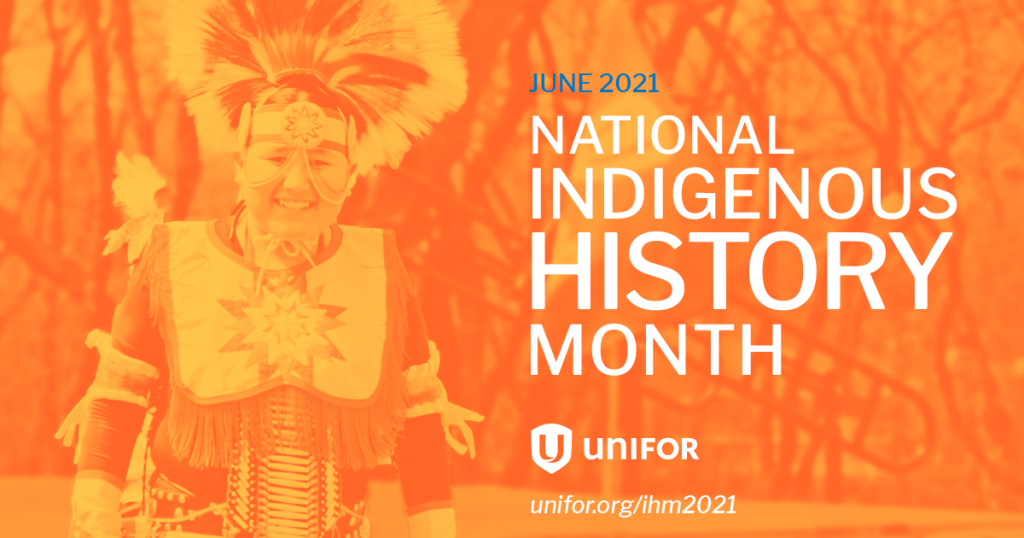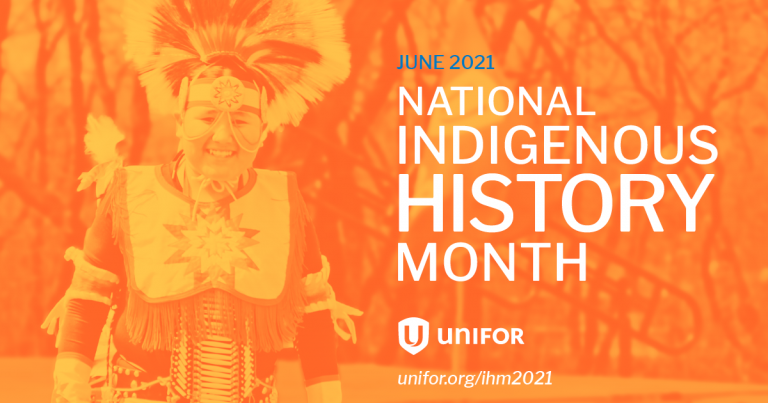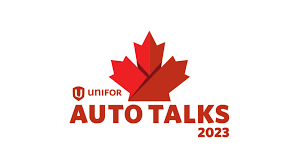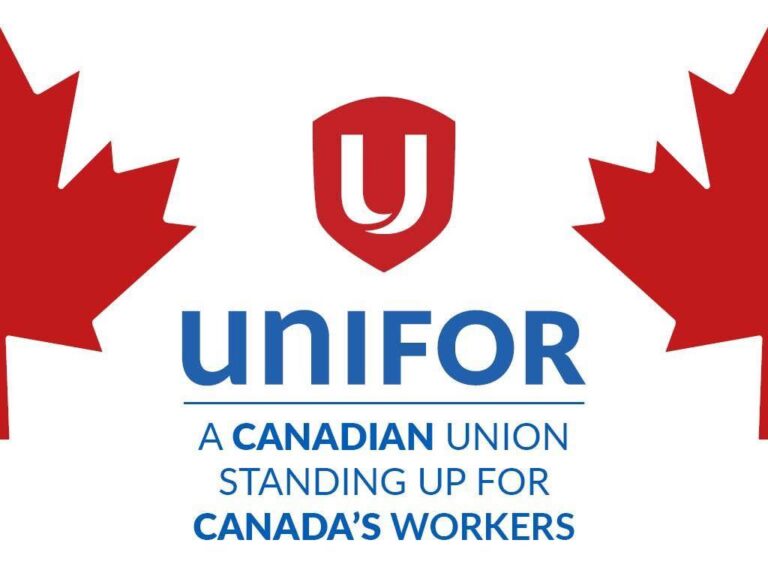
June 21st is National Indigenous Peoples Day. This year marks the 25th anniversary of National Indigenous Peoples Day. Together we should take the opportunity to recognize their trials and tribulations and learn more about the culture and diversity of First Nations, Inuit, and Metis People by taking part in the many activities happening across Canada.
While we celebrate the strength, brilliance and diversity of the cultures of First Nations, Inuit and Metis peoples this National Indigenous Peoples Day, Unifor is committed to using its bargaining power, mobilizing power and political power to bring about transformative change.
Unifor takes its lead from the final report of the Truth and Reconciliation Commission, tabled in 2015. The Commission’s action plan is a clear guide for all levels of government to implement policies that will help address the injustices of colonialism and cultural genocide in Canada.
In the upcoming year, our union will work to pressure the government to act on the following:
- The adoption of the long-awaited United Nations Declaration on the Rights of Indigenous People (UNDRIP). Blocked repeatedly by unelected Conservative Party caucus, the UNDRIP has already been adopted by most nations worldwide and the Government of British Columbia.
- The 231 calls for justice issued two years ago by the National Inquiry into Missing and Murdered Indigenous Women, Girls and two-spirited (MMIWG2S). The federal government’s recent response to the report was inadequate and more work is needed to make urgent, systemic changes to protect Indigenous women, girls and two-spirited people.
Like most Canadians, Unifor members were horrified by the announcement that the remains of 215 missing children have been discovered by the Tk’emlúps te Secwépemc on the site of the former Kamloops Indian Residential School.
Impromptu vigils sprung up across the country and people wore orange as an extension of the Orange Shirt Day that normally takes place in September. The Day is an annual event to honour and acknowledge the survivors of Canada’s genocidal residential school system. The slogan “Every Child Matters” is a call to reform social services that have historically treated Indigenous children as less important and less valuable than non-Indigenous children.
Unifor locals across Canada have made donations to Tk’emlúps te Secwépemc, the Indian Residential School Survivors Society and to the First Nations Learning and Caring Society.
As terrible as the Kamloops discovery was, Indigenous communities know that it is not unique. As such, Unifor supports the call of Indigenous leaders for a nationwide probe of former residential school sites. The federal government must ensure Indigenous communities have the resources to find answers about missing children as outlined in the Truth and Reconciliation Commission’s “Missing Children’s Project”.
Although COVID-19 restrictions prevent Unifor members from coming together in person, there are many ways members can participate in National Indigenous Peoples Day:
- Support the recommendations issued by the Truth and Reconciliation Commission. They are an urgent call for government and organizations to take meaningful action on many outstanding issues, ranging from protecting language and culture to education to ensuring justice for the survivors of residential school violence. Contact your Member of Parliament and demand they be a vocal supporter of the 94 Calls to Action within their caucus and to government. https://www.unifor.org/en/take-action/campaigns/tell-your-mp-implement-94-trc-calls-action
- For the month of June, Unifor’s series of Turtle Island Webinars have been sharing information about Indigenous history in Canada with Indigenous leaders and scholars. Don’t miss the final webinar in the series on June 22 at 1:30 p.m. Eastern time – exploring the importance of the United Nations Declaration of the Rights of Indigenous Peoples (UNDRIP) – a conversation with Brenda L. Gunn, Indigenous Scholar and Professor at the University of Manitoba Faculty of Law. https://onlineeducation.unifor.org/the_importance_of_undrip
- Take the #215 Pledge – join the call for leaders and decision-makers to take action so no child who died while in the care of a residential school is lost and that the experiences of all those affected by residential schools are honoured. https://www.215pledge.ca/
- National Centre for Truth and Reconciliation http://www.trc.ca/
- Learn more about the United Nations Declaration on Rights of Indigenous People (UNDRIP):https://www.indigenousbar.ca/pdf/undrip_handbook.pdf.
- Check out the Manitoba Keewatinowi Okimakanak (MKO) Youth Festival – June 21–25. The MKO annual youth festival celebrates and honours the creativity of Northern Indigenous youth. https://mkonation.com/honouringthegifts/
- Encourage support, by those who are able to, for local and regional organizations, programs or initiatives to engage in active reconciliation with Indigenous people.
- With all your efforts, please amplify Indigenous voices in your community.
You can see further info from Unifor at:






